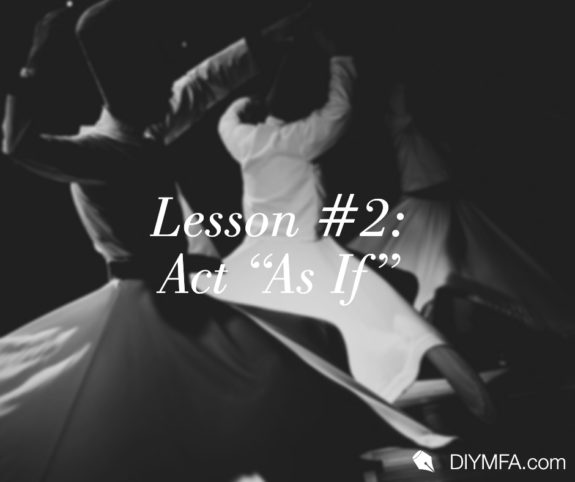In the last installment of “Ten Lessons in Ten Years” I talked about the importance of building the right things. In this article, I’ll walk you through how to make that happen. The key is to act “as if.”
Lesson #2: Act “As If”
Creativity doesn’t happen in a vacuum. We write books because we have stories to share, stories that need to be read. This means when we do our creative work, we must think about the people who will receive that work: our audience.
But what if we’re just getting started? What if we don’t have an audience yet? Once upon a time, DIY MFA was just a crazy idea I would write about on my teeny-tiny personal blog. There was no word nerd community. I had a grand total of 12 followers (and one of them was my mother). But I learned early on that the key to building an audience is to act as if you already have one, even if you don’t (yet).
Act “as if” is not the same as “fake it ’til you make it.”
Let me make one thing clear: when you act “as if,” the goal is not to deceive people or pretend to be something you’re not. Acting “as if” is not the same as “fake it ’til you make it.” Rather, it is about aligning your behaviors with the role you want to grow into. Writers who act “as if,” put in the hours and word count as though they are writing for a living… even if they haven’t gotten there yet. They treat their writing like a real job (because it is one) and they show up at the page whether or not they feel inspired.
Acting “as if” means trusting that your external circumstances will eventually align with your internal vision. In the meantime, you need to show up as the person you want to become. This means making choices and crafting your life as if you are already a professional writer—even if right now it feels like a pipe dream. Writers who make hobbyist choices, remain hobbyists forever. If you want writing to be your profession, you have to step up and act like a pro. Act like the person you want to become, and eventually, you will become them.
When you fully embody that role, people will believe you.
I remember the first time I went to BookExpo, the major book trade show in the United States. It was 2011 and DIY MFA was little more than a twinkle in my eye. I didn’t have a team. I didn’t have a huge platform. All I had was a dream and the will to make it happen. So I put on my big-girl business outfit, gave myself a pep talk, and went to the show.
At the first booth I approached, I walked right up, shook hands with one of the people, and said: “I’m Gabriela Pereira, founder of DIY MFA , the do-it-yourself alternative to a traditional MFA. We feature books and authors on our website, and I’d love to hear about titles you have coming up.”
I thought they would laugh me out of the Javits Center, that they would say “you’re not for real,” and I would spend the rest of my life hiding in shame. But that didn’t happen. Instead, the person said “DIY MFA? Oh yeah, of course! Here, let me show you this book that you’re going to love…” And just like that, I had made a connection.
When you fully embody your “as if” role and step into it with confidence, people are not going to question you. This isn’t because you’re really good at lying or you’re playing Jedi mind tricks on them. The truth is, people don’t like to admit they don’t know something. Being in-the-know is social currency. What I realized pretty quickly in 2011 is that no one was going to question whether DIY MFA was for real because that would mean they would have to reveal they didn’t know what DIY MFA was. But if I talked about it with confidence, then no one would have reason to question otherwise.
But something else happened that I didn’t expect. The more I spoke confidently about DIY MFA and the more people took me and DIY MFA seriously, the more I began to take myself seriously, too. I started out merely acting “as if” but somewhere along the way, I stopped acting and became that thing. What began as a part I was playing—a role I was stepping into—eventually became ingrained in me and fused with my personality.
Acting “as if” is a powerful tool, but (not to go all Spiderman on you) “with great power comes great responsibility” and if you’re not careful, this technique can backfire.
This technique only works if you deliver what you promise.
Acting “as if” is not permission to be lazy. It’s not about reaching some middling level of success and then resting on those laurels. There are some people who act “as if” but don’t put in the work to back it up. Instead, they sit back, put their feet up, and ride the wave of mediocrity. Sooner or later, the world will notice when someone isn’t acting “as if,” but is just acting.
When you act “as if” you are in effect making a promise to the other person. You are showing up as your best, most confident self, but you are also promising that you are capable of becoming that person. And you’re promising to put in the blood, sweat, and tears to make that transformation happen.
Slackers hear “act ‘as if’” and take it as permission to boast and embellish, to pretend to be something they’re not. True writers, artists, word nerds like us, hear that phrase, understand the responsibility that comes with it and are prepared to do the work to back it up. True artists know the truth: acting “as if” is not an act. Deep down, you are already that person, you’re just letting that inner awesome self step into the spotlight.
It is a shift in alignment between perception and reality.
Most writers I know are quick to praise the skill of others but slow to acknowledge their own. We are often far more critical of ourselves and our own work than we would be of anyone else’s. This is why I am sure—with every ounce of my being—that it would be impossible for a true writer, a true artist, to misuse the act “as if” technique. Someone who acts “as if” purely out of ego, someone who exaggerates their accomplishments and brags about themselves, cannot possibly be a true artist, a true writer.
Okay, maybe there was that guy in your writing workshop who acted like his work was so much better than it really was and got all defensive if anyone said anything that wasn’t glowing praise. There are some writers like that, but they are few and far between. Plus, I don’t consider these true writers. I consider them posers.
Don’t get me wrong, there are many creative people who have a distorted view of their own work, but it usually goes toward the opposite extreme. When a writer’s perception of their work doesn’t match that work’s quality, it is often not because the writer thinks their work is better than it really is, but that they perceive it as worse.
When we act “as if” we align how we perceive our own creative work with its actual quality. We admit to ourselves that our work has merit and that we are willing to stand behind that work. Even if our writing is still rough and messy, acting “as if” means we are willing to take the necessary steps to make our creative vision a reality.
Acting “as if” is a leap of faith. Are you willing to jump? Take my hand and we’ll leap together.

Gabriela Pereira is an author, speaker, and entrepreneur who wants to challenge the status quo of higher education. As the founder and instigator of DIYMFA.com, her mission is to empower writers, artists and other creatives to take an entrepreneurial approach to their education and professional growth.
Gabriela earned her MFA in writing from The New School and speaks at college campuses and national conferences. She is also the host of DIY MFA Radio, a popular podcast where she interviews bestselling authors and book industry professionals and author of the book DIY MFA: Write with Focus, Read with Purpose, Build Your Community.







